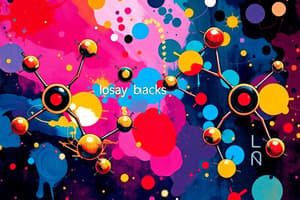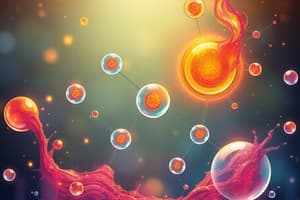Podcast
Questions and Answers
What are coordination compounds?
What are coordination compounds?
- Compounds formed when a metal ion is surrounded by ligands (correct)
- Molecules formed by two or more metals bonded together
- Ionic compounds with high magnetic properties
- Substances formed through the process of corrosion
Which of the following is a practical application of electrochemistry?
Which of the following is a practical application of electrochemistry?
- Making soap
- Manufacturing paper
- Growing plants
- Producing batteries (correct)
What is the focus of chemical kinetics?
What is the focus of chemical kinetics?
- Reaction rates and mechanisms (correct)
- Energy changes in a system
- Types of chemical bonds
- Color changes during reactions
In coordination compounds, how can they be identified?
In coordination compounds, how can they be identified?
What is a key concept in electrochemistry?
What is a key concept in electrochemistry?
Which of the following is NOT a topic covered in Class 12 Chemistry?
Which of the following is NOT a topic covered in Class 12 Chemistry?
What functional group is present in alcohols?
What functional group is present in alcohols?
Which functional group is found in phenols?
Which functional group is found in phenols?
What is the characteristic feature of ethers?
What is the characteristic feature of ethers?
Which of the following topics lays the foundation for understanding factors influencing reaction rates?
Which of the following topics lays the foundation for understanding factors influencing reaction rates?
What is essential for navigating the world of organic chemistry?
What is essential for navigating the world of organic chemistry?
Which key qualities are highlighted as important for success in chemistry?
Which key qualities are highlighted as important for success in chemistry?
Flashcards are hidden until you start studying
Study Notes
Chemistry in Class 12: Exploring Advanced Concepts
As you delve into the world of Chemistry in your final year of high school, you'll encounter a range of captivating topics that pave the way for your future in the sciences. In this article, we'll focus on six key areas of interest from Class 12 Chemistry: coordination compounds, electrochemistry, chemical kinetics, alcohols, phenols, and ethers.
Coordination Compounds
Coordination compounds are formed when a central metal ion or atom is surrounded by ligands, which are atoms, ions, or molecules. These compounds are a fundamental part of inorganic chemistry, due to their unique properties and applications in various fields such as catalysis, magnetism, and materials science. Coordination compounds can be identified by their characteristic colors, magnetic properties, and geometric structures.
Electrochemistry
Electrochemistry is the study of chemical reactions that involve electron transfer. In Class 12, you'll explore concepts such as electrolysis, corrosion, and the Nernst equation. This subject not only provides a deep understanding of chemical reactions that occur in an electrochemical cell, but also has practical applications in energy storage and conservation such as batteries and fuel cells.
Chemical Kinetics
Chemical kinetics is the study of reaction rates and mechanisms, which play a crucial role in understanding chemical processes. You'll dive into topics such as rate laws, reaction mechanisms, and collision theory. These concepts will lay the foundation for a deeper understanding of the factors that influence reaction rates and the reaction pathways.
Alcohols, Phenols, and Ethers
Organic chemistry makes up a large part of the Class 12 curriculum, and alcohols, phenols, and ethers are just a few examples of functional groups you'll encounter. Alcohols contain an -OH group, while phenols contain an aromatic ring bonded to an -OH group. Ethers, on the other hand, consist of two organic groups bonded to an oxygen atom. A thorough understanding of these functional groups and their properties is essential for navigating the vast world of organic chemistry.
The previously mentioned topics are just a sampling of the content you'll encounter in your Class 12 chemistry course. By delving deeper into these subjects, you'll develop a solid foundation in chemistry that will serve as the bedrock for your future scientific pursuits. As you continue your journey, remember that perseverance, curiosity, and a willingness to learn are the keys to success in this captivating field.
Good luck!
Studying That Suits You
Use AI to generate personalized quizzes and flashcards to suit your learning preferences.




